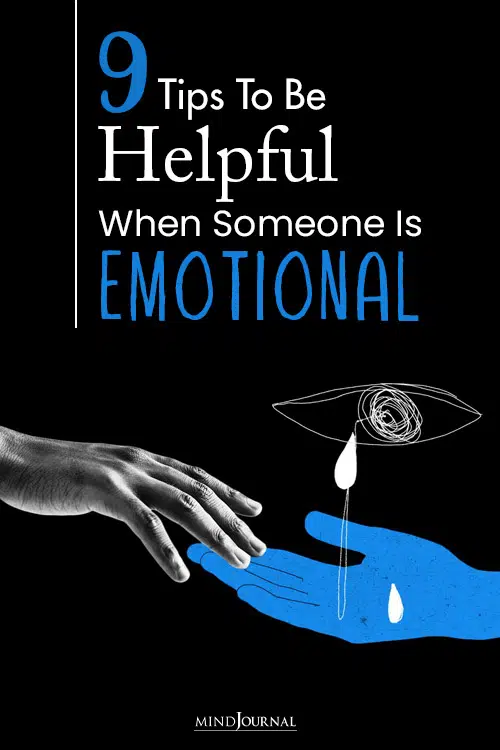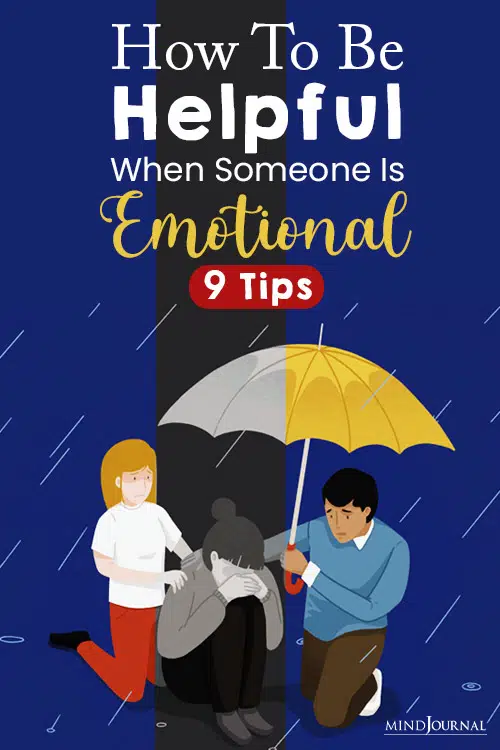You can either be helpful or ineffectual when someone gets emotional. There are three common reactions when someone you are with expresses strong emotion, such as sadness, anger, or paralyzing fear:
1. You excuse yourself, saying something like, “I’ll give you some space.”
2. You rush in and try to make the person feel better, calm down, or not worry.
3. You sit there awkwardly, trying to figure out what you should do. You probably end up doing nothing other than shaking your head in agreement or offering suggestions without knowing what is really going on.
None of these reactions is useful. Whether the person is a dear friend or a work colleague, it is a gift to help a person work through emotional moments.
I’m not saying these are insensitive reactions. But if you respond in the ways above, you are impulsively acting on your reaction to their emotions. Your own fear, anger, or disappointment may be keeping you from being present for them.
Related: 3 Human Desires To Thrive: How To Make Someone Feel Seen, Loved And Understood
Listen; Don’t Save Or Retreat
Bryant H. McGill said, “One of the most sincere forms of respect is actually listening to what another has to say.” This is especially true if the person is emotional. Most people want to end conversations when someone cries or gets angry, but then you miss the opportunity to help the person discover what they need. And it’s likely you will make the person feel worse if you mentally disappear or try to fix them.
Tears and defensive anger are natural physiological responses when someone feels hurt, disappointed, or sad. It could be a result of stress or a buildup of things gone wrong. It’s not known why some people more readily cry than others, but its possible crying is a healthy reaction that helps people process what has occurred more quickly, not a dysfunction.

Help Them Think Instead Of Shutting Them Down
People often do not know what is behind their emotions. The more emotion they feel, the less they are able to reflect on their situation. Nobel prize winner Daniel Kahneman said in his book, Thinking Fast and Slow, that we spend most of our time jumping to conclusions. The more attached we become to our “story” of the situation, the more difficult it is to see what else is possible.
Instead of avoiding or trying to fix someone, become keenly interested in learning more about what they think happened and why. This helps them reflect on their story at a time when they can’t reflect well on their own. When details come to light, they may see new choices in how to act going forward.
As you listen to their story, be curious about what they expected to happen, but didn’t, or what makes them think they won’t get what they hoped for. We often get angry or irritated when we don’t get what we expected. We are afraid of what might happen next that will hurt us. When you find what is triggering the emotions — what they feel they lost or is at stake — you both can explore what they might do next.
After exploring what triggered their emotions, ask what outcome they would like to have instead of what they have now. If what they want is even somewhat achievable, ask if there is anything in their control to do to make this happen. Together, you might discover the best way to move on.
Here Are Some Guidelines To Follow:
Don’t:
1. Run away physically or mentally.
2. Treat them as if they are broken and need you to fix or heal them.
3. Judge them for not handling their emotions better.
Related: The 5 Levels of Listening: How To Be A Better Listener
Do:
1. Create a safe space by breathing calmly and caring about the human in front of you who is struggling with a situation.
2. Accept their emotions as a normal human reaction.
3. Summarize and encapsulate what they say and express it so they can “see” their story outside of their head.
4. Try to discover what that they have lost or think they will be losing that is important to them.
5. When they realize what they need now, ask what they will do next.
6. If you don’t feel safe because their anger is escalating, leave. If you feel you are at risk of being harmed, remove yourself as soon as possible. No reason needed, or just say, “I am not comfortable with where this conversation is going.”
Remember to release your judgment when people get emotional. Breathe when you feel your own anger, fear, or disappointment. See the person in front of you as capable of growing with some reflection. As I wrote in my book, The Discomfort Zone, “They want you to be present more than they need you to be perfect.”
See more tips on having effective conversations at www.Covisioning.com
References:
Kahneman, Daniel. (2011). Thinking Fast and Slow. Farrar, Straus and Giroux
Written By Marcia Reynolds Originally Appeared On PsychologyToday










Leave a Reply
You must be logged in to post a comment.